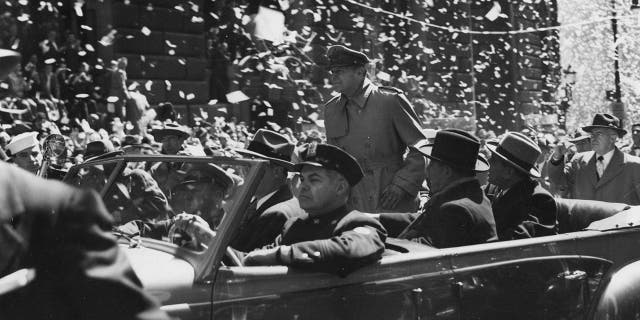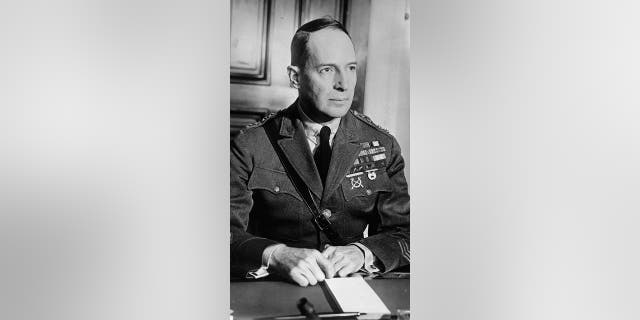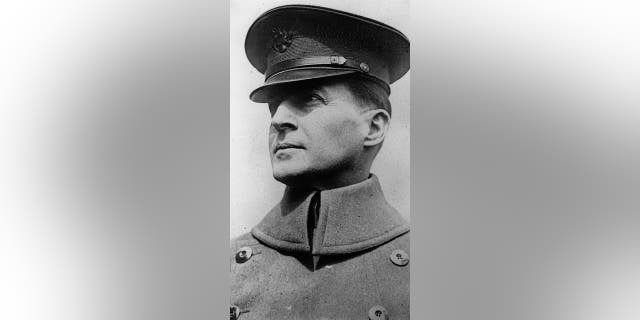On this day in history, March 11, 1942, MacArthur leaves Philippines, vows to return
Gen. Douglas MacArthur and his family left the Philippine island of Corregidor on this day in history, March 11, 1942.
President Franklin Delano Roosevelt ordered MacArthur to leave the island after it became clear it was no longer safe for MacArthur to remain with his troops, notes the History Channel website.
Deeply distraught, MacArthur had to leave 90,000 troops behind, the same site said.
From 1935 until 1946, the Philippines was a commonwealth of the United States.
By mid-1941, it was believed Japan had set its sights on invading the Philippines.
On July 26, 1941, Roosevelt issued a presidential order “calling into service of the United States of America all the organized military forces of the Government of the Commonwealth of the Philippines,” according to the website for the Filipino Veterans Recognition and Education Project (FilVetREP).

Gen. Douglas MacArthur, pictured here, was pulled out of retirement in July 1941 to lead the newly created United States Army Forces in the Far East. (Keystone/Getty Images)
MacArthur, who had retired from the military four years before, was designated as the general in charge of the newly created United States Army Forces in the Far East.
However, the “task facing MacArthur seemed impossible,” said the FilVetREP website.
The forces suffered from a lack of equipment and manpower, compared to the encroaching Japanese army.
By March of the following year, it was evident the Japanese would overpower the troops in the Philippines — and that MacArthur would have to leave.
ON THIS DAY IN HISTORY, SEPT. 15, 1950, US TROOPS LAND AT INCHON, TURNING THE TIDE OF THE KOREAN WAR
The journey to safety was treacherous.
During the more than 500-mile boat ride to the island of Mindanao, MacArthur faced mines, rough seas and the threat of the Japanese Navy, says the History Channel.
While in Australia, MacArthur received the devastating news the troops still in the Philippines would not be receiving relief.
When he arrived at Mindanao more than a day after departing from Corregidor, MacArthur praised the work of the boat’s commander, John D. Bulkeley.
“You’ve taken me out of the jaws of death, and I won’t forget it,” said MacArthur.
Several days after arriving at Mindanao, MacArthur and his family flew to northern Australia. They then took another flight and a train to Melbourne, says the History Channel.

Gen. Douglas MacArthur vowed to return to the Philippines — a promise he made good on over two years after he was ordered to leave. (Getty Images)
On June 30, 1942, in Melbourne, MacArthur was presented with the Medal of Honor for “conspicuous leadership in preparing the Philippine Islands to resist conquest, for gallantry and intrepidity above and beyond the call of duty in action against invading Japanese forces, and for the heroic conduct of defensive and offensive operations on the Bataan Peninsula,” the Congressional Medal of Honor Society website indicated.
ON THIS DAY IN HISTORY, MARCH 9, 1959, BARBIE MAKES FASHIONABLE WORLD DEBUT AT NEW YORK TOY FAIR
“He mobilized, trained and led an army, which has received world acclaim for its gallant defense against a tremendous superiority of enemy forces in men and arms,” said the same source.
“His utter disregard of personal danger under heavy fire and aerial bombardment, his calm judgment in each crisis, inspired his troops, galvanized the spirit of resistance of the Filipino people and confirmed the faith of the American people in their Armed Forces,” the citation also said.
While in Australia, MacArthur received the devastating news that the troops still in the Philippines would not be receiving relief.
Speaking of the Philippines, MacArthur promised the press, “I shall return” — a phrase that would “become his mantra during the next two and a half years,” the History Channel website noted.

Gen. Douglas MacArthur (1880-1964) was awarded the Medal of Honor for his service in the Philippines. (Getty Images )
The American and Filipino troops that were still in Corregidor were left without food or support — and their other supplies were quickly overtaken by the Japanese, that site notes.
“Bataan fell in April, and the 70,000 American and Filipino soldiers captured there were forced to undertake a death march in which at least 7,000 perished,” said the website.
CLICK HERE TO SIGN UP FOR OUR LIFESTYLE NEWSLETTER
Corregidor surrendered in May, with an additional 15,000 American and Filipino troops captured.
With the war in Europe taking up most of the resources, the Philippines were not a priority at the time.
On Oct. 20, 1944, MacArthur made good on his promise to return to the Philippines, coming ashore on the island of Leyte and later making a radio broadcast announcing to the country that he had returned.
CLICK HERE TO GET THE FOX NEWS APP
Only about 30,000 of the 90,000 troops left in the Philippines on March 11, 1942, lived to see MacArthur’s return in 1944, said the History Channel.
“I’m a little late,” he told the troops, “but we finally came.”
